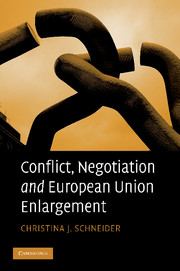Book contents
- Frontmatter
- Contents
- List of Illustrations
- List of Tables
- List of Acronyms
- Acknowledgements
- 1 Introduction
- 2 EU enlargements and transitional periods
- 3 A rationalist puzzle of EU enlargement?
- 4 A theory of discriminatory membership
- 5 EU enlargement, distributional conflicts, and the demand for compensation
- 6 The discriminatory of membership
- 7 Discriminatory membership and intra-union redistribution
- 8 Conclusion
- Bibliography
- Index
4 - A theory of discriminatory membership
Published online by Cambridge University Press: 17 July 2009
- Frontmatter
- Contents
- List of Illustrations
- List of Tables
- List of Acronyms
- Acknowledgements
- 1 Introduction
- 2 EU enlargements and transitional periods
- 3 A rationalist puzzle of EU enlargement?
- 4 A theory of discriminatory membership
- 5 EU enlargement, distributional conflicts, and the demand for compensation
- 6 The discriminatory of membership
- 7 Discriminatory membership and intra-union redistribution
- 8 Conclusion
- Bibliography
- Index
Summary
In the 1980s, France and Italy opposed the unconditional accession of Spain and Portugal to the EU. There was widespread concern in both countries that Spanish and Portuguese participation in the CAP would be seriously damaging to their agricultural sectors. Spain's accession alone would increase the Community's agricultural area by 30% and its farm workforce by 25%. Community agricultural production would rise sharply by 25% for vegetables, 48% for fresh fruit, and 59% for olive oil. Wine of Spanish vintage would constitute nearly a quarter of European Union (EU) output. Even though France supported Spanish membership in principle, it opposed any substantive talks until both sides could agree on a common basis for negotiations.
The bargaining model presented in this chapter clarifies why distributional conflicts can hinder the widening of the EU despite overall political and economic gains. It also helps understand the conditions that make successful enlargement more likely. In general, EU members that foresee distributional conflict have incentives to oppose the unconditional accession of a new state. This is a potential stumbling block to enlargement because the admission of the applicant must be approved unanimously. These tensions need not be fatal, however, if the net gains from enlargement are positive. In that case, it is possible to settle these disputes by redistributing some of these gains from the applicants and/or the relative winners within the EU to the relative losers.
- Type
- Chapter
- Information
- Conflict, Negotiation and European Union Enlargement , pp. 55 - 76Publisher: Cambridge University PressPrint publication year: 2008

